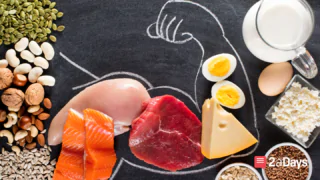As the New Year begins, many student-athletes set out on a journey to prioritize their health and performance by making resolutions centered around navigating nutrition. Whether it's a commitment to eat healthier, maintain weight, or optimize energy levels, sustaining these resolutions can be challenging amidst the busyness of student life and athletic commitments.
Below are a few practical strategies to help student-athletes stay on track with their nutrition resolutions and foster a sustainable and balanced approach to fueling their athletic endeavors.
1. Set Realistic Goals
The foundation of any successful resolution lies in setting realistic and achievable goals. Instead of aiming for drastic dietary changes, consider setting small, measurable, and realistic objectives that align with your athletic and academic lifestyle. For instance, focus on incorporating a specific number of servings of fruits and vegetables into your daily meals or swapping sugary snacks for healthier alternatives. Gradual changes are more likely to be sustainable in the long run.
2. Plan Ahead
As a student-athlete, your schedule can be demanding, leaving little room for spontaneous, healthy meals. Planning ahead is the key to overcoming this challenge. Take time each week to outline your meals, snacks, and hydration needs. Preparing nutritious snacks and meals in advance can save time during hectic days and ensure that you have the right fuel available when you need it most.
3. Nutrient Timing
Understanding when to fuel your body is crucial for sustaining energy levels throughout the day and optimizing athletic performance. Aim for balanced meals that include a mix of carbohydrates, proteins, and healthy fats. Ensure that you consume a well-balanced meal or snack before and after workouts to support muscle recovery and replenish glycogen stores. Timing your nutrition effectively can contribute to enhanced endurance, strength, and overall well-being.
4. Stay Hydrated
Proper hydration is often underestimated but is fundamental for overall health and athletic performance. Carry a reusable water bottle with you throughout the day and aim to drink water consistently. Dehydration can impair physical and cognitive function, so staying hydrated is essential for academic success as well. Consider incorporating hydrating foods like water-rich fruits and vegetables into your meals and snacks to support your fluid intake.
5. Smart Snacking
Snacking is an integral part of a student athlete's day, but it's essential to make wise choices. Opt for nutrient-dense snacks that provide sustained energy rather than reaching for empty-calorie options. Nuts, seeds, yogurt, whole-grain crackers, and fruits make excellent choices to keep you fueled between meals. Being mindful of portion sizes and choosing snacks that align with your nutritional goals can contribute to better overall health and performance.
6. Seek Professional Guidance
If you find yourself struggling with navigating the nutrition world or have specific performance goals, seeking guidance from a registered dietitian or nutritionist can be immensely beneficial. These professionals can create personalized nutrition plans based on your individual needs, taking into account your training regimen, academic schedule, and health goals. They can offer valuable insights, address challenges, and provide ongoing support to help you stay on track.
7. Incorporate Variety
Maintaining a diverse and balanced diet is crucial for meeting your nutritional needs and preventing boredom with your food choices. Explore different fruits, vegetables, proteins, and whole grains to keep your meals interesting and ensure you obtain a wide range of essential nutrients. Experimenting with various recipes and cuisines can make healthy eating an enjoyable and sustainable part of your lifestyle.
8. Mindful Eating
Amidst the hustle and bustle of student life, it's easy to fall into the habit of mindless eating. Practice mindful eating by paying attention to your body's hunger and fullness cues. Avoid distractions like screens or studying while eating, allowing yourself to savor and enjoy your meals. Being present during meals can help prevent overeating and foster a positive relationship with food.
As a student-athlete, navigating nutrition is not just about making short-term changes but embracing a lifestyle that supports your overall well-being and athletic performance. By doing the things listed above, you can navigate the challenges of student life while prioritizing your health. Remember that small, consistent steps lead to lasting results, and with dedication and perseverance, you can fuel your triumph both in the classroom and on the field.







